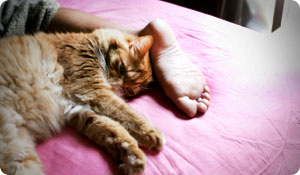
Don't Let Allergies Cause Sleepless Nights
If you suffer from allergies, you know that the sneezing, runny nose, coughing and stuffy head can make it difficult to fall asleep. Further, even when you do drift off, you may wake up again, tossing and turning, trying to get comfortable without success. As a result, you'll likely feel tired in the morning and desperate for some relief.
Allergies and Sleep
The good news about allergies and sleep is that there're things you can do to gain control of you allergies so they don't ruin your night. Review the following suggestions on ways you can minimize your allergies so you can sleep tight.
Set Limits: If seasonal allergies are holding you back from getting the sleep you desire, you don't have to become resigned to being tired. One of the first things you can do to break the allergies and sleep connection is to set your limits in order to keep the outside from creeping in. To this end, you can close windows and run your air conditioning to keep pollen out of your sleeping space. Also shower when you come indoors to remove any pollen trapped in your hair.
Less is More: If dust mites make you sneeze and cough, you can banish them from your bedroom by removing carpeting and curtains where they can collect. Also wash your linens in very hot water regularly to remove any dust or animal hair that lingers in the weave. In addition, make dusting and vacuuming a regular part of your routine. (But wear a facemask, so you don't breathe in any dust particles that get into the air.)
Cover Up: You should use hypoallergenic bedding and cover your mattress and pillows in plastic casings that will keep dust mites away from your face. Also remove books, knick-knacks and stuffed animals from places where you spend the most time at night.
Timing Matters: Allergy medications can help to control your worst symptoms, but when you take them can make a big difference. The experts recommend taking them right before bed, so they'll be at their peak in your bloodstream in the early morning hours, when allergies can be at their strongest and if not controlled, could wake you from a deep sleep.
Be Aware
When it comes to allergies and sleep, it's also important to note that while many people suffers experience compromised sleep, not all of them are aware of this fact. So if you feel tired when you wake up and aren't sure why, it could indeed be because allergy-related congestion and postnasal drip are interrupting your sleep in tiny segments so quick you don't even know it. Of course, some allergy medications can cause drowsiness, too, which can further magnify how tired you feel in the morning.
Seek Help if Symptoms are Severe
If your allergies are causing you to feel exhausted and nothing you try seems to be enough to improve your sleep quality, you can also talk to your doctor. Often, undergoing allergy testing to identify your biggest triggers can be helpful. In addition, trying some new medications to control your symptoms can make a difference. And if all else fails, you might consider getting allergy shots to relieve your discomfort over time so that the nightmare of your allergies and sleep issues will recede. Then before you know it, you'll be able to sleep well all night and have sweet dreams.
Sources:
National Jewish Health
http://www.nationaljewish.org/about/mediacenter/pressreleases/2009/tips-to-help-get-a-good-night-s-sleep-despite-allergies.aspx
Allergy and Asthma Network: Mothers of Asthmatics
www.aanma.org/2009/02/sleep-matters-getting-a-good-night's-sleep-with-asthma-and-allergies/





